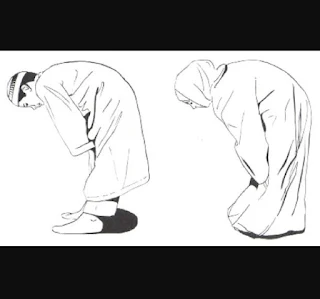Ruku (Bowing)Namaz benefits
Step by step benefits of namaz
1. Ruku – Bowing:
Ruku, which is the act of bowing during Salah (Islamic prayer), has several potential benefits for the body and mind. Here are some of the benefits associated with the practice of Ruku:
Stretching and Flexibility: Ruku involves bending forward from the waist, allowing for a deep stretch of the back, hamstrings, and calf muscles. Regular practice of Ruku can help improve flexibility and prevent muscle stiffness.
Spinal Health: The forward bending motion during Ruku helps promote spinal alignment and mobility. It can alleviate tension in the back and improve posture, reducing the risk of spinal disorders.
Abdominal Activation: During Ruku, the abdominal muscles are engaged as the body bends forward. This can help strengthen the core muscles, which contribute to stability and support for the spine.
Digestive System Stimulation: The compression of the abdominal area during Ruku can help stimulate digestion and improve gastrointestinal function. It may be particularly beneficial for individuals experiencing digestive issues or sluggish bowel movements.
Increased Blood Flow: The act of bending forward during Ruku encourages blood flow to the upper body, including the brain. This improved blood circulation can enhance oxygen and nutrient delivery to vital organs, promoting their overall health.
Mindfulness and Focus: Ruku serves as a moment of reflection and submission during prayer. It allows individuals to detach from worldly concerns and focus on their relationship with God. This practice of mindfulness and concentration can help reduce stress, promote mental clarity, and enhance overall well-being.
It's important to note that while Ruku may offer potential benefits, it is just one component of Salah and is primarily a religious practice. The intention and spiritual connection associated with Ruku are central to its significance. If you have any specific medical concerns, it's advisable to consult with healthcare professionals.




Comments
Post a Comment